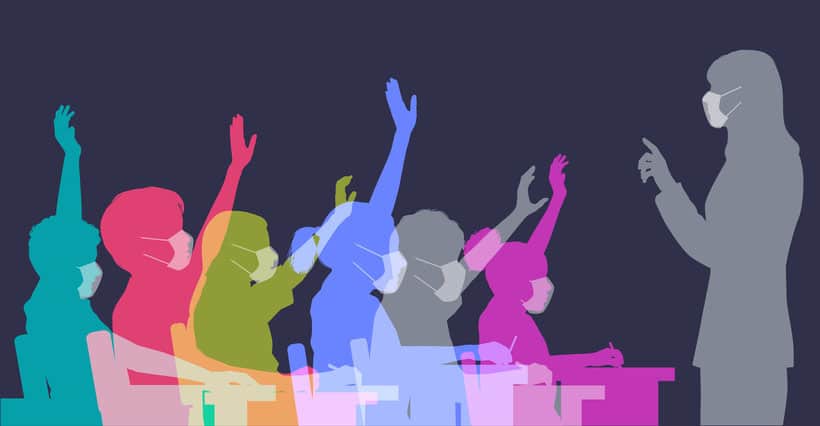
A little more than a year ago, I was a normal 14-year-old student. I attended school every day, was the lead in the school musical and hung out with friends after school and on weekends. My life was more or less just like everyone else’s my age.
Then, fifteen months ago, that world came to a halt. The night before my musical’s opening performance, the show was cancelled entirely. Then, on Monday morning, in-person school ended, and Zoom school began. I graduated eighth grade and started my first year of high school from my bedroom. I no longer saw my friends at all and barely even left my house.
Over the following months, I became accustomed to a new routine: waking up, working and doing Zoom school in my bedroom for eight or more hours a day, maybe (or maybe not) doing my homework, Facetiming my friends until late at night and then repeating everything the next day. For months on end. For more than a year of my life.
Although it may seem like a teenager’s dream to go to school from their bedroom — sleeping in, staying in my pajamas — in reality it is incredibly difficult. My friends and I have experienced this in different ways. It is nearly impossible to concentrate in class and to stay consistently motivated. When we are at home, there are endless procrastination possibilities that we could not get away with if we were in school: Instead of going to the library and studying during free periods, we can watch Netflix on our beds; instead of paying attention to what the teacher is lecturing about in class, we can turn our Zoom screens off and scroll through TikTok; instead of doing homework during crucial evening hours, we FaceTime our friends.
Additionally, the majority of my peers have told me they routinely cheat on assignments and tests because they can. Tests are taken at home alone, and teachers have no way of knowing whether students are looking up answers on their phones. As a result, students (myself not included) have little incentive to concentrate in class or put a real effort into studying. It may look like we are maintaining our grades, but for most it is not being accomplished honestly.
Then there is the social component of Zoom school — or lack thereof. As an extrovert, not having social interaction throughout my day has been incredibly difficult. When stuck in my room the whole school day, Zoom school becomes a form of solitary confinement. Even in a house filled with my siblings and parents, Zoom school is extremely isolating.
I have longed to return to in-person school. When my friends from other schools began returning to classrooms but my school, Harvard-Westlake, would not open, I became exceedingly jealous of my friends’ return to normalcy. What I did not expect was the shock of that normalcy when it became my turn to return.
A few weeks ago, my school reopened for one day per week of in-person learning. At first I was ecstatic. I could not wait to socialize with classmates that I had only met through tiny screens, to get out of my room, to be in an actual classroom.
But after my first day back, I began dreading the in-person days to come. I didn’t realize that while I hated being alone every day, I had also gone through a process of getting used to it. It’s not that it became normal. It’s more that actual normalcy — hanging out with friends in person — had become abnormal. Unlike any previous time in my life, I found social interactions strange and exhausting. Before lockdown, I could spend days on end with my friends and still keep going. Now after being at school for only an hour, I feel completely drained.
After my first day back, I began dreading the in-person days to come.
And although I had longed for the return of in-person classes, now my in-person class experience is very different from before. Although it is slightly easier to concentrate in person, I suddenly have anxiety that I never felt before. In Zoom class, I could turn off my camera and not have to obsess over what I looked like or what I was doing. Now, it feels like eyes are on me at all times. I can no longer see what I look like in my Zoom camera or become invisible by turning off my camera. People see me constantly, and I no longer have control over that.
And everyone is in masks. It is incredibly awkward and stressful to try to socialize with people I’ve never met before when we can’t see much of each other’s faces. Masks are an enormous barrier to normal human interaction.
While in quarantine, I longed for a return to normalcy. Now that my world has partially returned, I wonder: Is it worth it, and when will I finally adjust to the world that used to be my normal?
Maayan Lerman Mazar is in ninth grade at Harvard-Westlake School in Los Angeles.
 RSS Feed
RSS Feed















 May 15th, 2021
May 15th, 2021  FAKE NEWS for the Zionist agenda
FAKE NEWS for the Zionist agenda  Posted in
Posted in  Tags:
Tags: 













